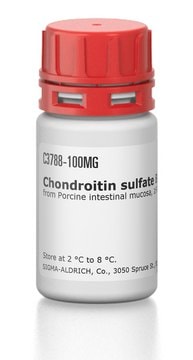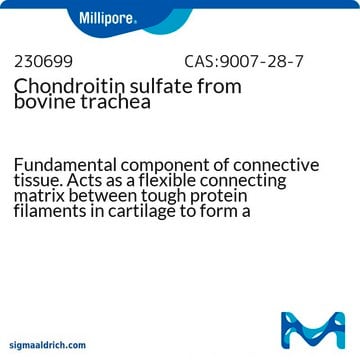C6737
Chondroitin sulfate sodium salt from bovine cartilage
98-102% (CPC, titration)
About This Item
Productos recomendados
biological source
bovine cartilage
Quality Level
grade
standard (for CPC (cetylpyridinium chloride) titration)
assay
98-102% (CPC, titration)
form
powder
optical activity
[α]20/D -30 to -20 °, c = 5% (w/v) in water
impurities
<10.0% water (Karl Fischer)
color
white to off-white
solubility
H2O: soluble 50 mg/mL, clear to hazy, colorless to faintly yellow
cation traces
Na: 7.4-8.8% (anhydrous)
storage temp.
2-8°C
SMILES string
[Na+].CC(=O)N[C@H]1[C@H](O)O[C@H](CO)[C@H](OS([O-])(=O)=O)[C@@H]1O[C@H]2O[C@@H]([C@H](O)[C@@H](O)[C@@H]2O)C(O)=O
General description
Application
Biochem/physiol Actions
Components
Caution
Preparation Note
Other Notes
Storage Class
13 - Non Combustible Solids
wgk_germany
WGK 2
flash_point_f
Not applicable
flash_point_c
Not applicable
ppe
Eyeshields, Gloves, type N95 (US)
Certificados de análisis (COA)
Busque Certificados de análisis (COA) introduciendo el número de lote del producto. Los números de lote se encuentran en la etiqueta del producto después de las palabras «Lot» o «Batch»
¿Ya tiene este producto?
Encuentre la documentación para los productos que ha comprado recientemente en la Biblioteca de documentos.
Los clientes también vieron
Nuestro equipo de científicos tiene experiencia en todas las áreas de investigación: Ciencias de la vida, Ciencia de los materiales, Síntesis química, Cromatografía, Analítica y muchas otras.
Póngase en contacto con el Servicio técnico







